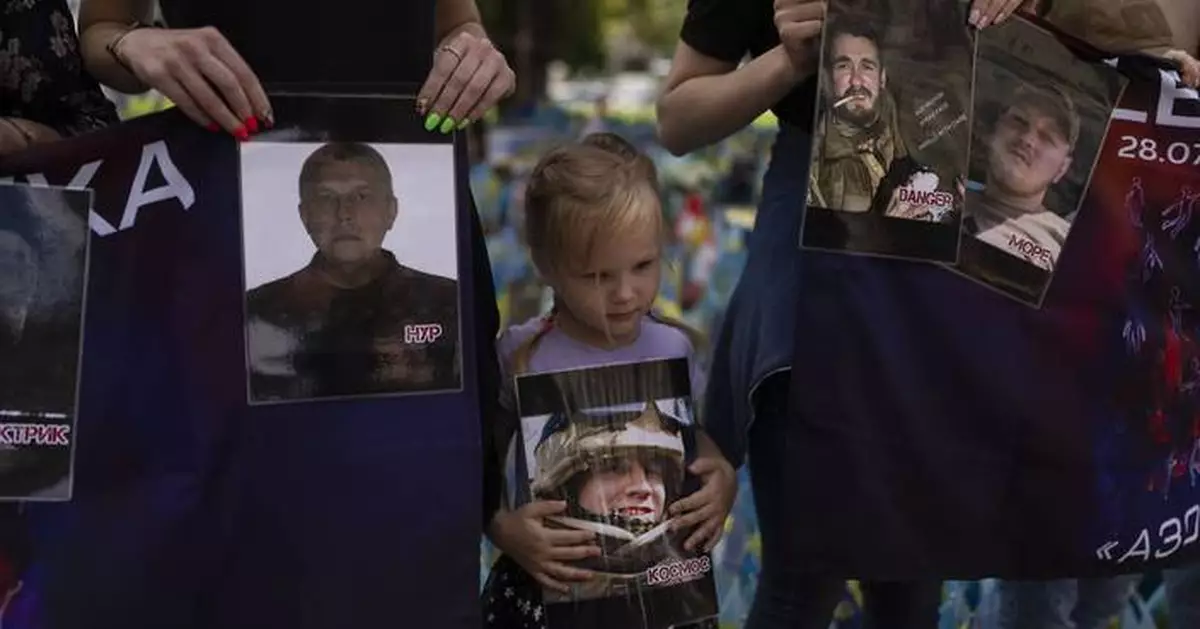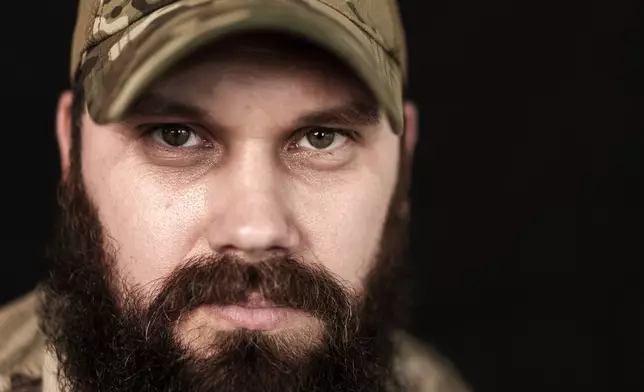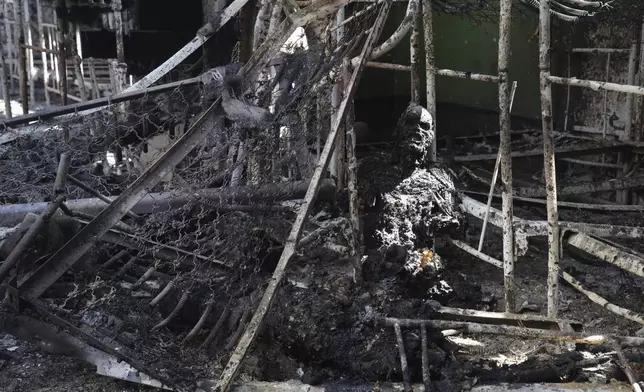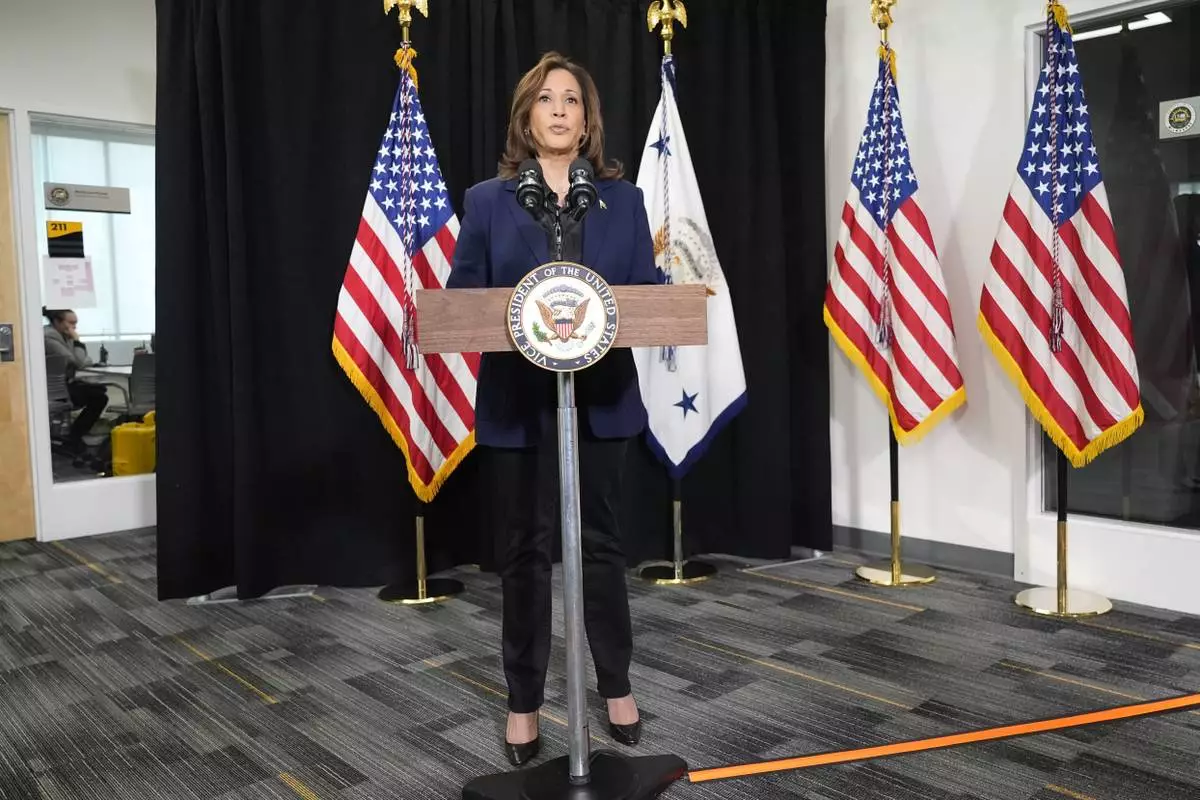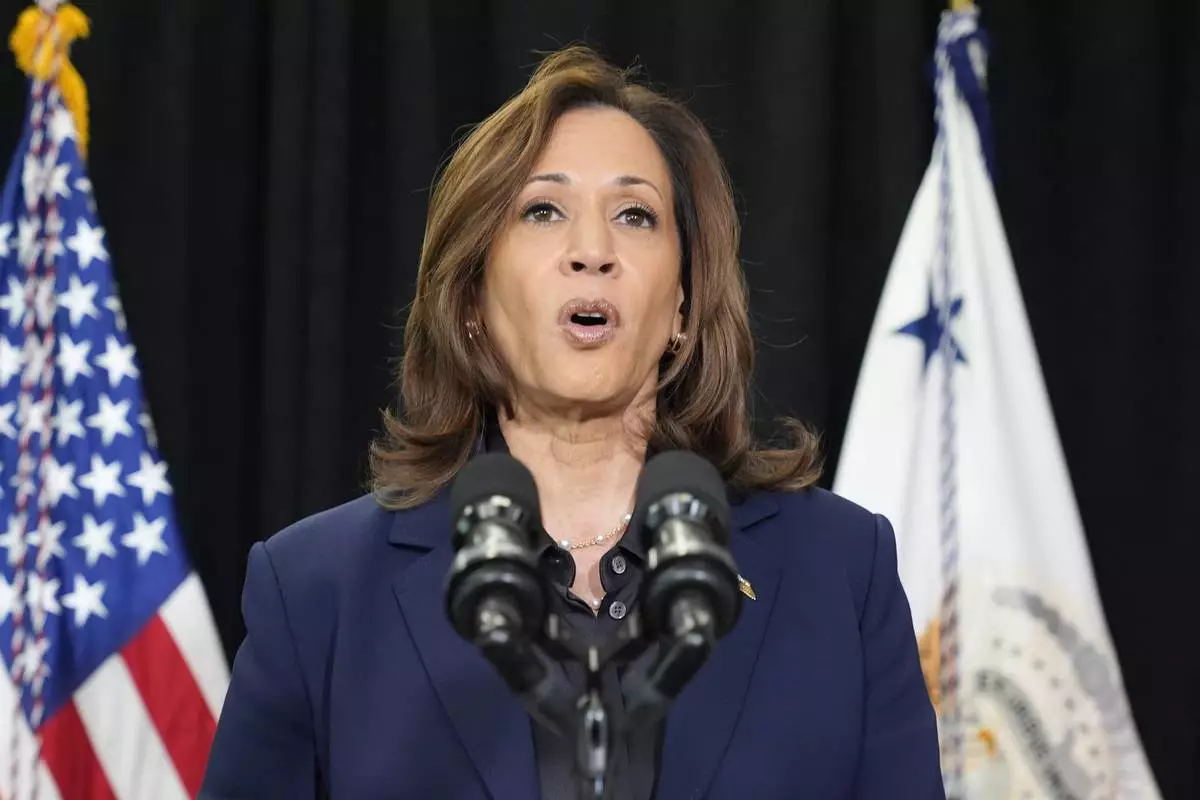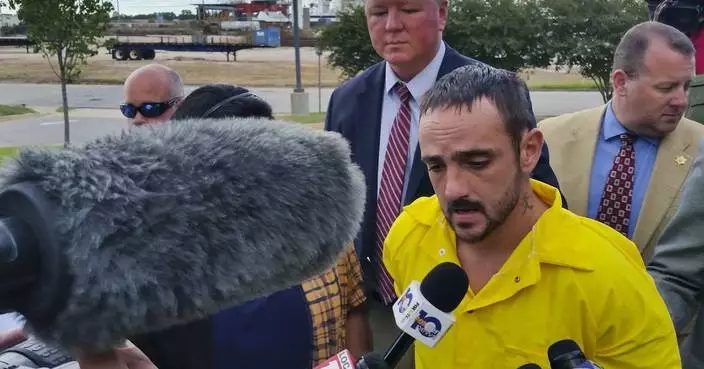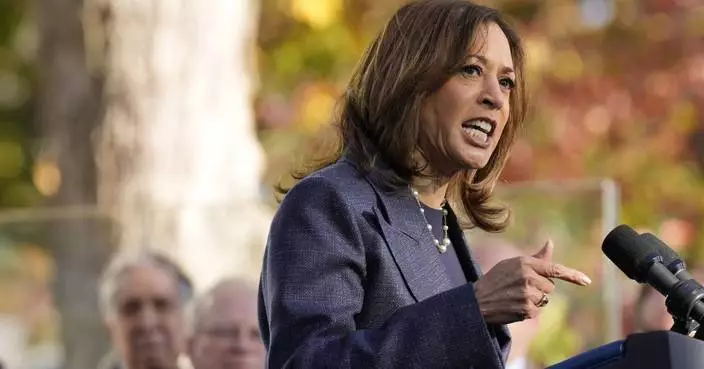KYIV, Ukraine (AP) — The former prisoners of war still puzzle over the strange events leading up to the night now seared into their memories, when an explosion ripped through the Russian-controlled Olenivka prison barracks and killed so many comrades two years ago.
Among the survivors: Kyrylo Masalitin, whose months in captivity and long beard age him beyond his 30 years. Arsen Dmytryk, the informal commander of the group of POWs that was shifted without explanation to a room newly stocked with bare bunks. And Mykyta Shastun, who recalled guards laughing as the building burned, acting not at all like men under enemy attack.
“Before my eyes, there were guys who were dying, who were being revived, but it was all in vain,” said Masalitin, who is back on the front line and treated as a father-figure by the men he commands.
The Associated Press interviewed over a dozen people with direct knowledge of details of the attack, including survivors, investigators and families of the dead and missing. All described evidence they believe points directly to Russia as the culprit. The AP also obtained an internal United Nations analysis that found the same.
Despite the conclusion of the internal analysis that found Russia planned and executed the attack, the U.N. stopped short of accusing Russia in public statements.
Of 193 Ukrainians in the barracks, less than two dozen made it back home. More than 50 died on the night of July 28, 2022. Around 120 are missing and believed detained in somewhere in Russia. Russia accused Ukraine of striking its own men with U.S.-supplied missiles.
There are no active international investigations into the attack and a Ukrainian inquiry is one of tens of thousands of war crimes for investigators there, raising wider questions about whether those who committed crimes in occupied areas can ever face justice.
The U.N. has rejected Russia’s claims that Ukrainian government HIMARS targeted the men, as do the victims who returned in prisoner exchanges, like Masalitin. When the former POWs have time to reflect – rare since many have returned to the fight – they say too many things don’t add up.
In the days following the Olenivka deaths, U.N. Secretary-General António Guterres launched an independent mission to investigate. Russia refused to guarantee the mission's safety and its members never traveled either to occupied territory in the eastern Donetsk region or to Ukrainian-held territory. It dissolved five months later.
But when survivors began to return to Ukraine in exchanges, a U.N. field team that had been in-country since 2014 sought them out.
That team analyzed 70 open-source images, 20 statements by Russian officials along with 16 survivor interviews from Russian television. They conducted in-depth interviews with 55 freed POWs who were in the barracks or elsewhere in Olenivka during the attack. Their conclusion: Russia planned and executed the attack.
The 100-page analysis circulated at the highest levels of the U.N. but was never intended to be published in full. Some of the evidence was incorporated piecemeal into broader U.N. reports on the war, including one that said the missile traveled from east to west. The Russian Federation controls the territory east of where the prisoners were kept. The UN never publicly blamed Russia.
The lists of names the Russians drew up in late July 2022 had no explanation, no context. All the men listed were from the Azov unit who became national heroes after holding out for months against an overwhelmingly larger Russian force in the city of Mariupol. The prisoners were told to be ready. No one knew why.
On the morning of July 27, 2022, the group was rounded up and led to an industrial section of the colony, away from the other five POW barracks. They were taken to a cinder-block building with a tin-plate roof and 100 bunks, no mattresses and a hastily dug pit toilet, multiple survivors told AP.
“Everything in the barracks was prepared very quickly,” said Arsen Dmytryk, who outranked the others and became the informal leader. The barbed wire was cheap and flimsy, and there were machine tools inside, indicating that the building was recently a workshop.
The prison director visited to tell them that their old barracks were under renovation, although plenty of other prisoners had remained. Ukrainians who have been since released said there was no renovation.
That first day, the guards dug trenches for themselves, said Shastun. Ukraine’s Security Service told AP that their analysis confirmed the presence of the unusual new trenches.
On July 28, the colony management ordered the guard post moved further away, and for the first time the barrack guards “wore bullet-proof vest and helmets which they had not done before and unlike other colony personnel who rarely wore them,” according to a section of the internal U.N. analysis later incorporated into public reports.
On the night of July 28 around 10:30 p.m., Dmytryk completed his checks, cut the lights, climbed into the top bunk and fell asleep at once. An explosion woke him perhaps 45 minutes later, followed by the sound of a Grad missile launcher. But he’d heard that before and drifted back to sleep.
Ukrainian POWs elsewhere in the colony told the U.N. investigators that the Grad fire muffled sounds of the bigger explosions.
Dmytryk’s memories then turn apocalyptic. His body burned with shrapnel wounds. Fire raged. Men screamed in pain. And he climbed down from his bunk, he checked the pulse of the man below him. He was already dead. He and other witnesses told AP they ran outside through broken walls to beg the guards to send help for the injured.
“They fired into the air, saying ‘stay away from the gates, don’t come closer,’” Dmytryk recalled.
If Dmytryk’s memories are a narrative of horror, Shastun’s are more like disjointed film scenes. He recalled the guards just stood there laughing, tossing rags and flashlights at the panicked Ukrainians.
It took hours before POW medics were sent from the other barracks to help, around the same time as Russian forces brought in trucks and told survivors to load them with the most severely wounded.
“We carried them on stretchers, lifted them into the car, unloaded them and then ran back to get the other wounded,” Shastun said. One person died in a comrade’s arms. It was mid-morning when they finished, and the trucks were piled with bloody men.
Dmytryk was among them, his face caked in dried blood. He said men in another truck died before they made it to the hospital in Donetsk. The U.N. said in its public report of March 2023 that slow medical care worsened the death toll.
“The transported us like cattle, not stopping, speeding over bumps and taking sharp turns,” he said.
Also among the wounded was Serhii Alieksieievych, whose wife Mariia last caught sight of him in his hospital bed in a video circulating on Russian media, slowly answering questions as he recovered from his injuries.
Back at Olenivka, Shastun was one of approximately 70 survivors with lesser injuries who were taken to two 5x5 meter (yard) cells as the last of the trucks drove away, to be isolated from the rest of the prison colony. There were wooden pallets for sleeping and a single toilet in each.
The internal U.N. analysis said their isolation was intended to prevent survivors speaking to others in the colony about what happened that night because some prisoners had access to mobile phones and had direct contact with Ukraine. It also left them unaware of the debate raging outside.
According to the analysis, other Ukrainian prisoners were then sent to the bombed barracks and ordered to remove debris and the remaining bodies. Two hours later, that group was sent into a nearby hangar, and some saw men in camouflage bringing boxes of ammunition to the blast site and setting HIMARS fragments on a blue bench nearby.
Russian officials soon arrived, accompanied by Russian journalists whose images of twisted, charred bunk beds, HIMARS fragments and bodies laid out in the sun spread across the world.
The Ukrainians in the nearby hangar said after everyone was gone, the men in camouflage returned everything to the boxes and left.
As the clock ticked down to a U.N. Security Council meeting later that day, Russia and Ukraine blamed each other.
Russia opened an investigation and said Kyiv did it to silence soldiers from confessing to their “crimes” and used their recently acquired American-made HIMARS rockets. Ukraine denied the charge and said Russia was framing Ukraine to discredit the country before its allies.
The international community didn’t know who to believe. That’s when the U.N. secretary general announced it would conduct its own investigation, but negotiations to access the site were long and ultimately fruitless. Guterres’ special mission was disbanded on Jan. 5, 2023, having never traveled to Ukraine.
“The members of the mission were of the view that it would be indispensable for them to be able to access all the relevant sites, materials and victims in order to fulfil its task and establish the facts of the incident,” U.N. spokesman Stephane Dujarric told AP. Without that, the mission “was not in a position to provide any conclusions.”
But the separate Human Rights Monitoring Mission in Ukraine, which had been based in the country since Russia’s first invasion of Ukraine in 2014, didn’t wait. The team combed through testimonies on Russian television from 16 survivors taken to the hospital, examined public images from the site and analyzed 20 statements made by Russian officials who visited the prison.
The mission informally shared an abridged version of its preliminary analysis with the U.N.'s newly formed Olenivka probe. Then on Sept. 22, a surprise prisoner swap gave the Human Rights Monitoring Mission its first chance to speak to witnesses and survivors. But from the date of the explosion, it would take eight months for any of that material to emerge publicly, and then only in pieces.
Dujarric did not respond to questions about the internal analysis.
In July 2023, U.N. Human Rights chief Volker Turk publicly stated what the internal report had first said nearly a year before — that HIMARS were not responsible. Three months later, the U.N. devoted a section to Olenivka in its annual report on the human rights situation in Ukraine. Again, cribbing from the internal analysis, the report noted that HIMARS were not responsible, that the fragments shown by Russian officials were not “in situ,” the scene had been contaminated and physical evidence disturbed.
The report concluded that the damage “appeared consistent with a projected ordnance having travelled with an east-to-west trajectory.” It failed to note that Russia controlled the eastern territory.
A Ukrainian investigation is ongoing, according to Taras Semkiv of the Ukrainian prosecutor general’s war crimes unit. The challenge is to identify the weapon used, in hopes that could lead to who ordered the attack. Semkiv said it's been narrowed to three possibilities — artillery, planted explosives, or a grenade launcher.
The Olenivka director is named as a suspect in “conspiracy for the ill-treatment of POWs” but the investigation leaves open the probability that more people were involved. At the war crimes unit headquarters of the Ukraine Security Service, known as the SBU, meters-long charts line the walls, illustrating the hierarchy of Russian officials responsible for various sections of the front line.
Semkiv said no international investigators have requested information from the General Prosecutor’s Office since the deaths at Olenivka, including the disbanded U.N. fact-finding mission. He said initial optimism about the mission faded as soon as it became clear that they would not investigate at all if there was no access to the prison.
“Technology is advancing rapidly, and there are ways to assess the situation without the direct presence of an investigator or prosecutor at the scene,” he said.
Relatives of those missing from the bombed barracks say they’re now alone in their search for answers.
First there was hope “that the world would not turn its back on us,” said Mariia Alieksieievych, the wife of the soldier seen recovering in the Donetsk hospital video. Her letters to her husband are shots in the dark – she hands them to the Red Cross, but as far as she knows there’s never been access to the prisoners. She said Ukraine’s government gives them no help or news about whether the men could be included in any future exchanges and has ignored requests for a day of remembrance for the Olenivka victims.
Her fading hopes for an international investigation have been replaced by determination.
She and other relatives want the International Criminal Court to take up the case, but she’s realistic enough to know that’s a distant possibility.
Her goal in the meantime: “To save the lives of our defenders, to bring them home. Because in Russian captivity, death is not an isolated case.”
__
Associated Press journalists Illia Novikov, Vasilisa Stepanenko, Evgeniy Maloletka and Volodymyr Yurchuk contributed from Kyiv. Edith Lederer contributed from New York.
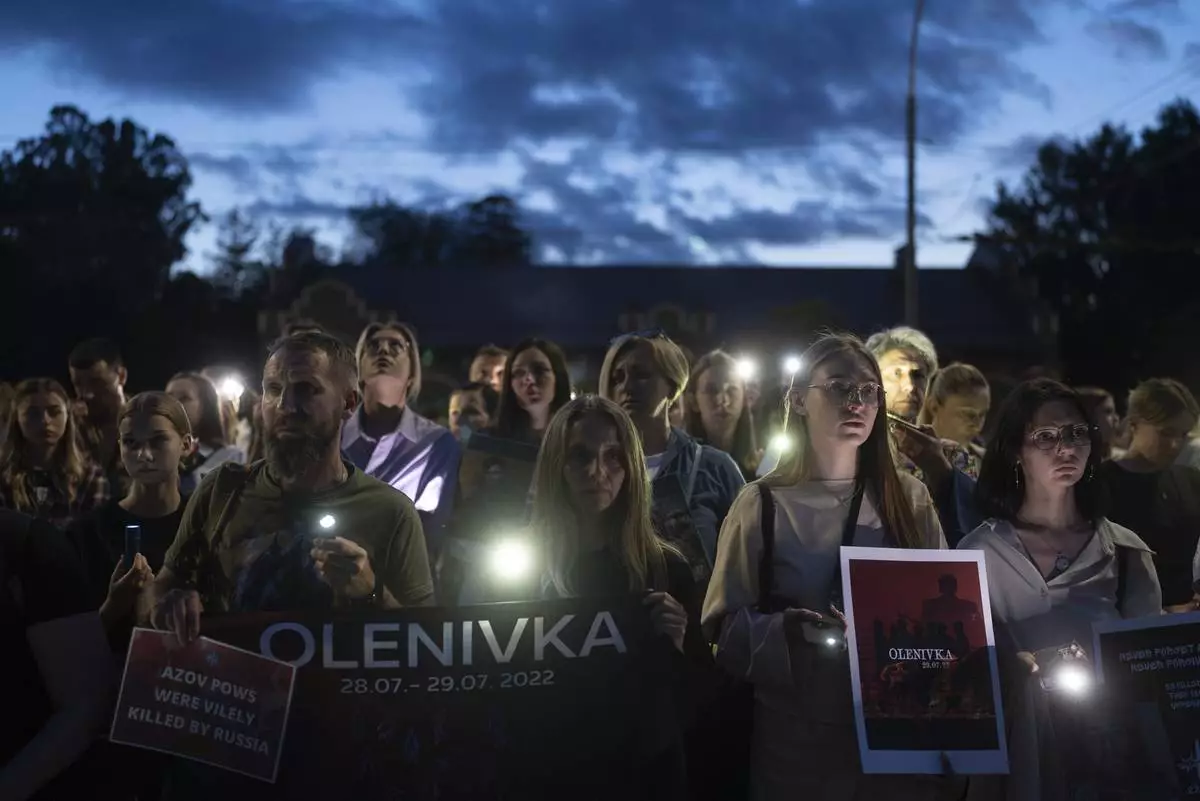
FILE - People hold signs outside the Russian embassy in Kyiv, Ukraine, on July 29, 2023, to mark the anniversary of the attack on the Russian-controlled prison barracks in Olenivka, eastern Ukraine, that killed dozens of Ukrainian POWs. An AP investigation interviewed survivors, family and investigators and obtained an internal U.N. analysis. All pointed to Russia as the culprit. (AP Photo/Jae C. Hong, File)
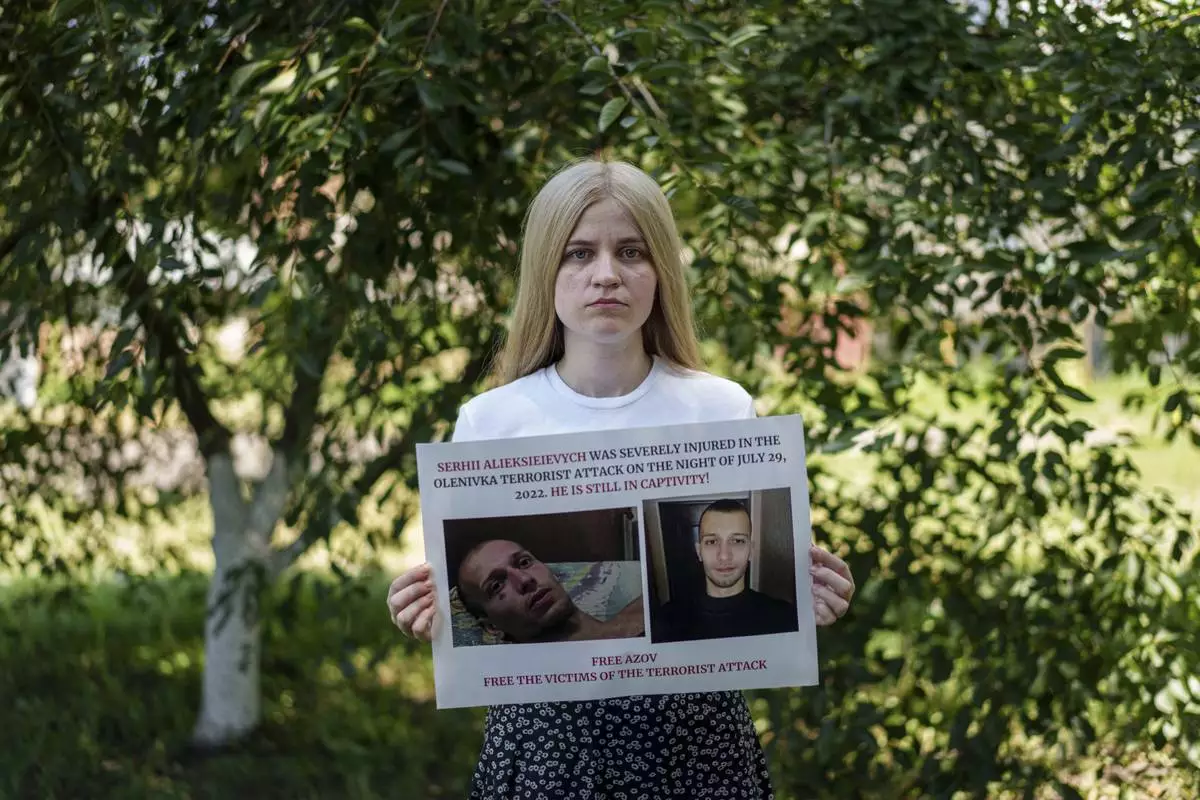
Mariia Alieksieievych, whose husband Serhii survived the explosions at the Russian-controlled Olenivka prison but is still a POW, attends a protest in Vinnitsia, Donetsk region, Ukraine, Saturday, July 13, 2024. Mariia last caught sight of him in his hospital bed in a video circulating on Russian media, slowly answering questions as he recovered from his injuries. (AP Photo/Evgeniy Maloletka)

Lt. Col. Ihor Benzeruk, a Ukrainian soldier who survived the explosions at the Russian-controlled Olenivka prison two years ago, sits for a portrait in Lyman, Donetsk region, Ukraine, Thursday, July 11, 2024. "Thanks to the herd instinct, I managed to get out. For me, this day remains as the day my comrades were executed," Benzeruk said. (AP Photo/Evgeniy Maloletka)
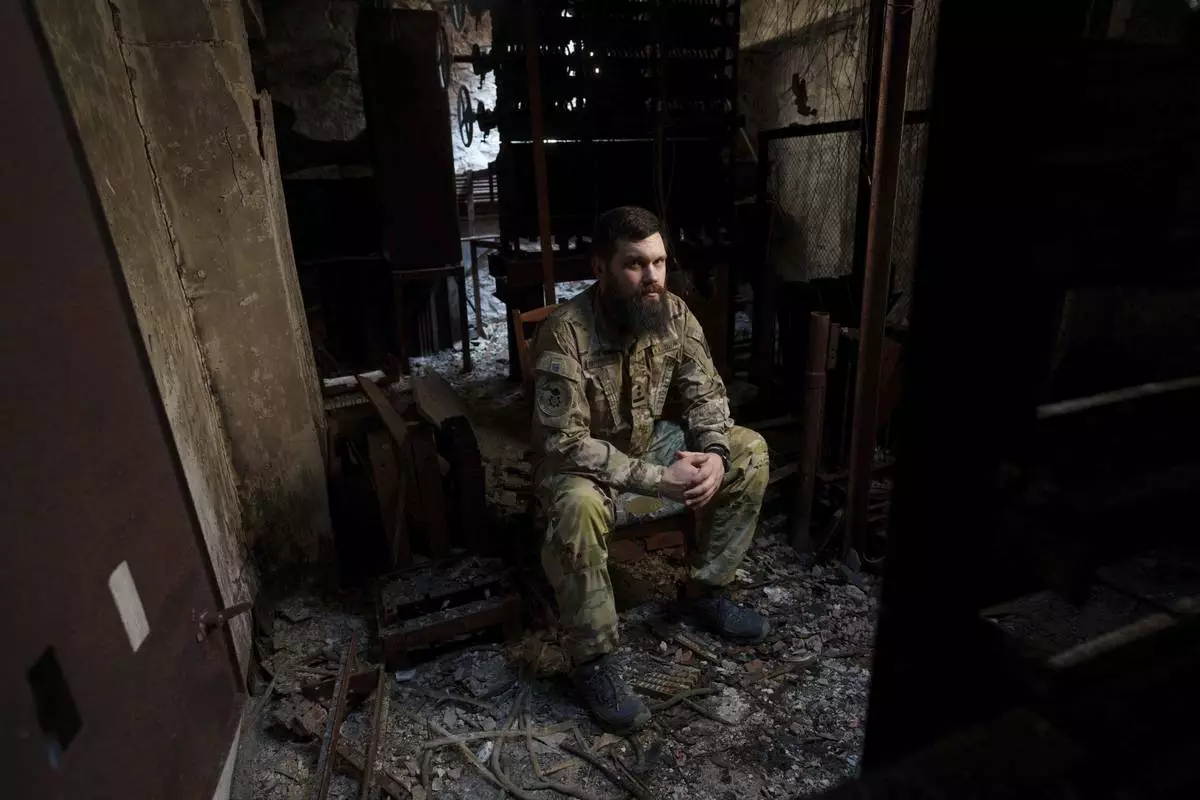
Lt. Col. Ihor Benzeruk, a Ukrainian soldier who survived the explosions at the Russian-controlled Olenivka prison two years ago, sits for a portrait in Lyman, Donetsk region, Ukraine, Thursday, July 11, 2024. "Thanks to the herd instinct, I managed to get out. For me, this day remains as the day my comrades were executed," Benzeruk said. (AP Photo/Evgeniy Maloletka)
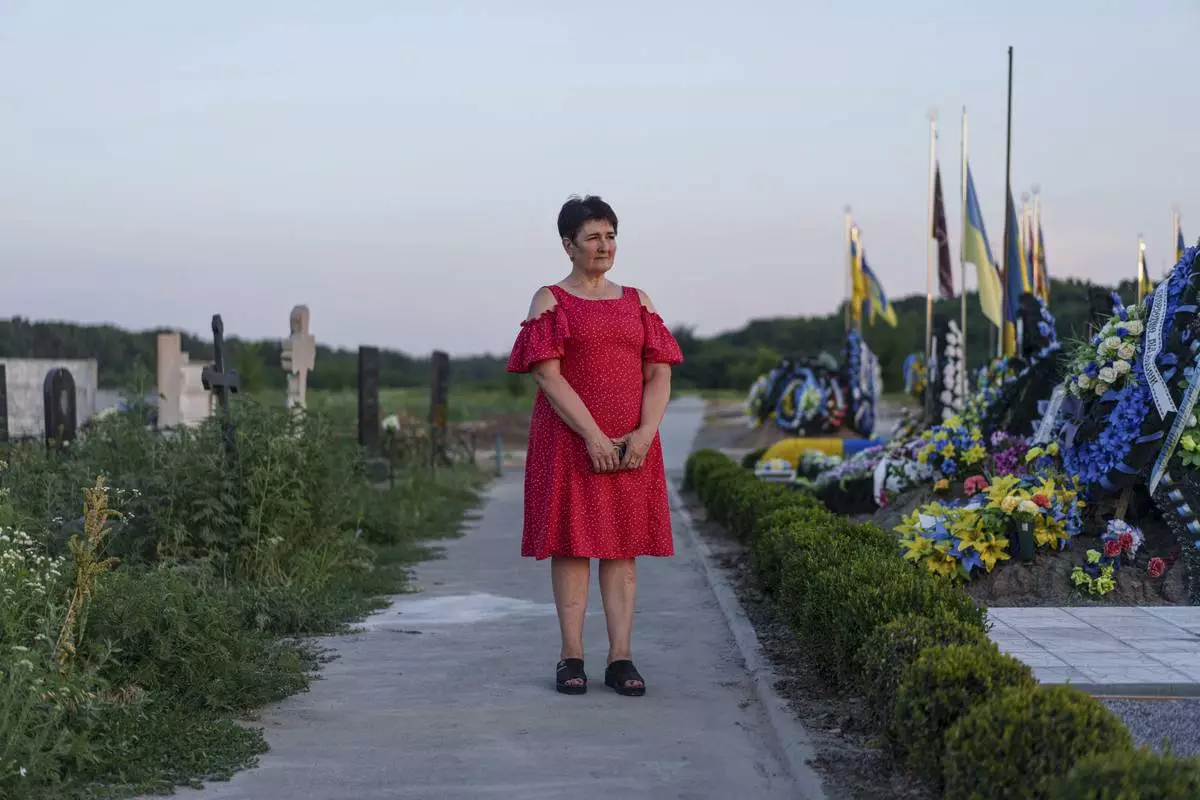
Oksana, the mother of a Ukrainian serviceman who was killed in the 2022 explosions at the Olenivka prison, stands near the grave of her son at a cemetery in Kremenchuk, Donetsk region, Ukraine, Friday, July 12, 2024. An AP investigation interviewed survivors, family and investigators and obtained an internal U.N. analysis. All pointed to Russia as the culprit.(AP Photo/Evgeniy Maloletka)
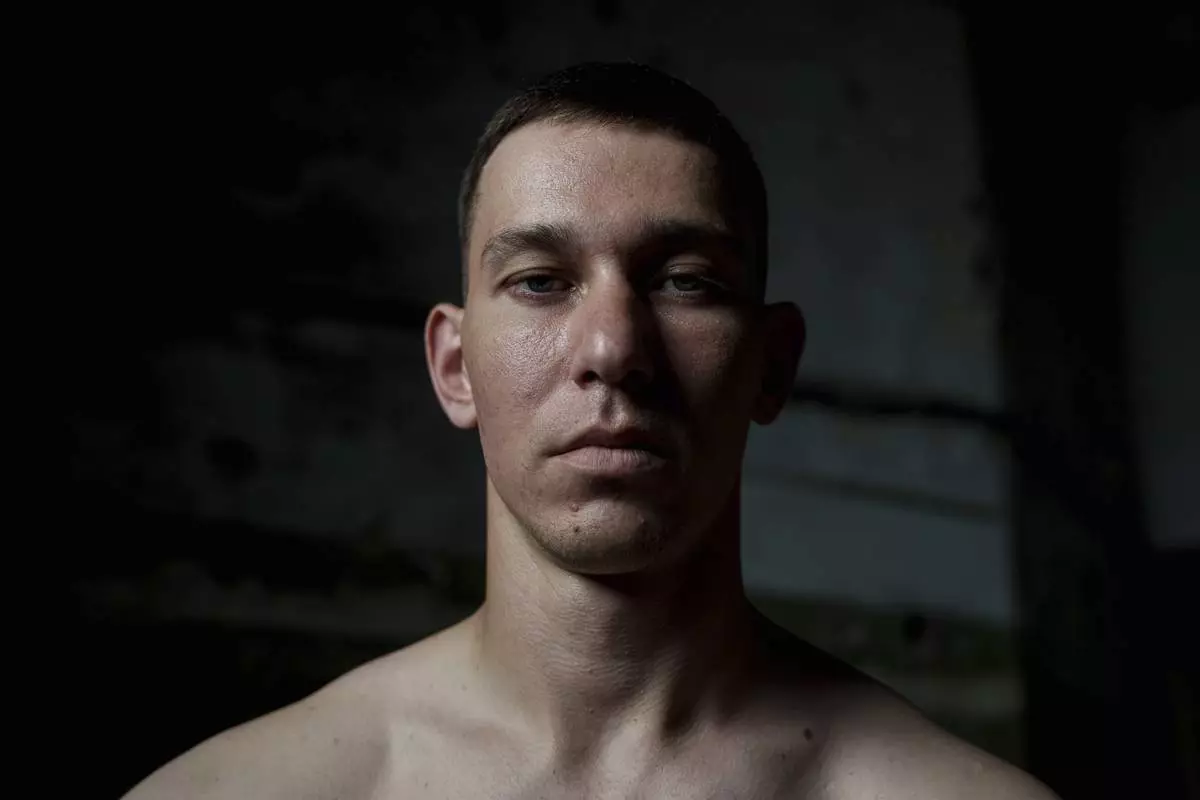
Maj. Oleksii Bordun, a Ukrainian soldier known as Satyrenko who survived the explosions at the Russian-controlled Olenivka prison two years ago, sits for a portrait in Lyman, Donetsk region, Ukraine, Thursday, July 11, 2024. “For me and for all of us, this day is a tragedy,” Bordun said. (AP Photo/Evgeniy Maloletka)
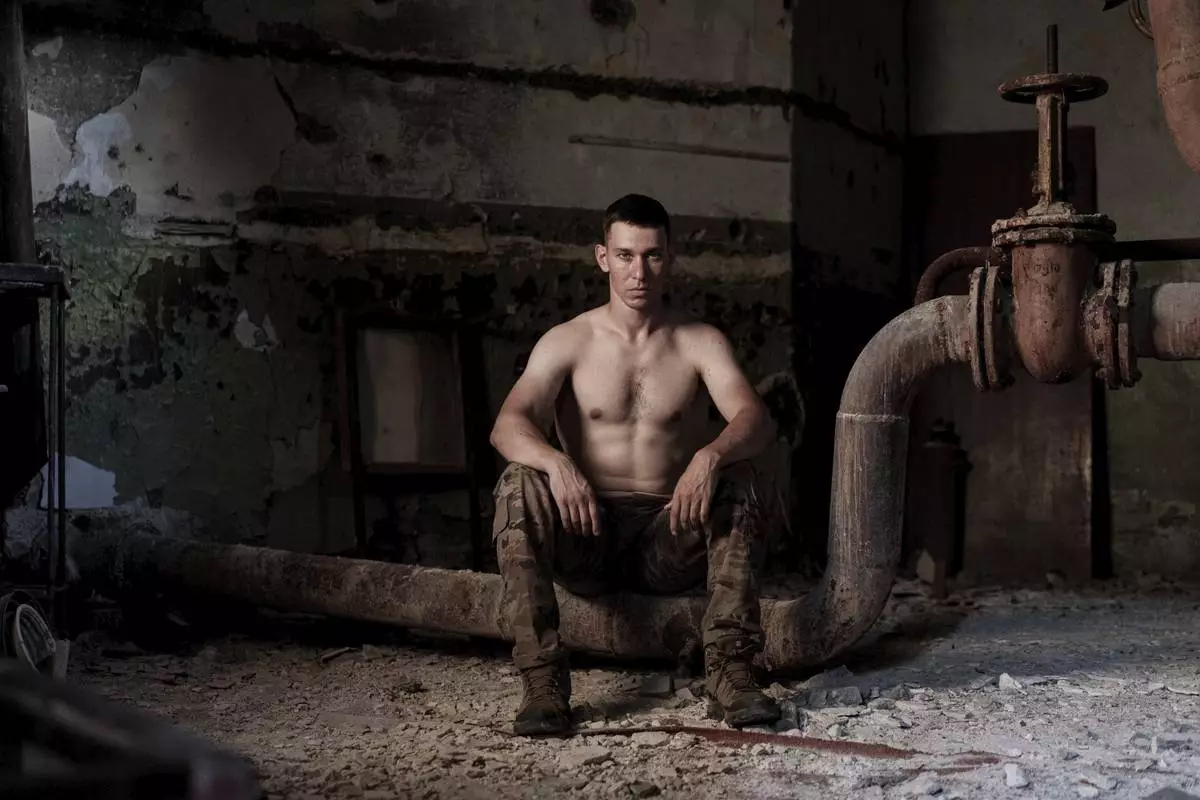
Maj. Oleksii Bordun, a Ukrainian soldier known as Satyrenko who survived the explosions at the Russian-controlled Olenivka prison two years ago, sits for a portrait in Lyman, Donetsk region, Ukraine, Thursday, July 11, 2024. “For me and for all of us, this day is a tragedy,” Bordun said. (AP Photo/Evgeniy Maloletka)
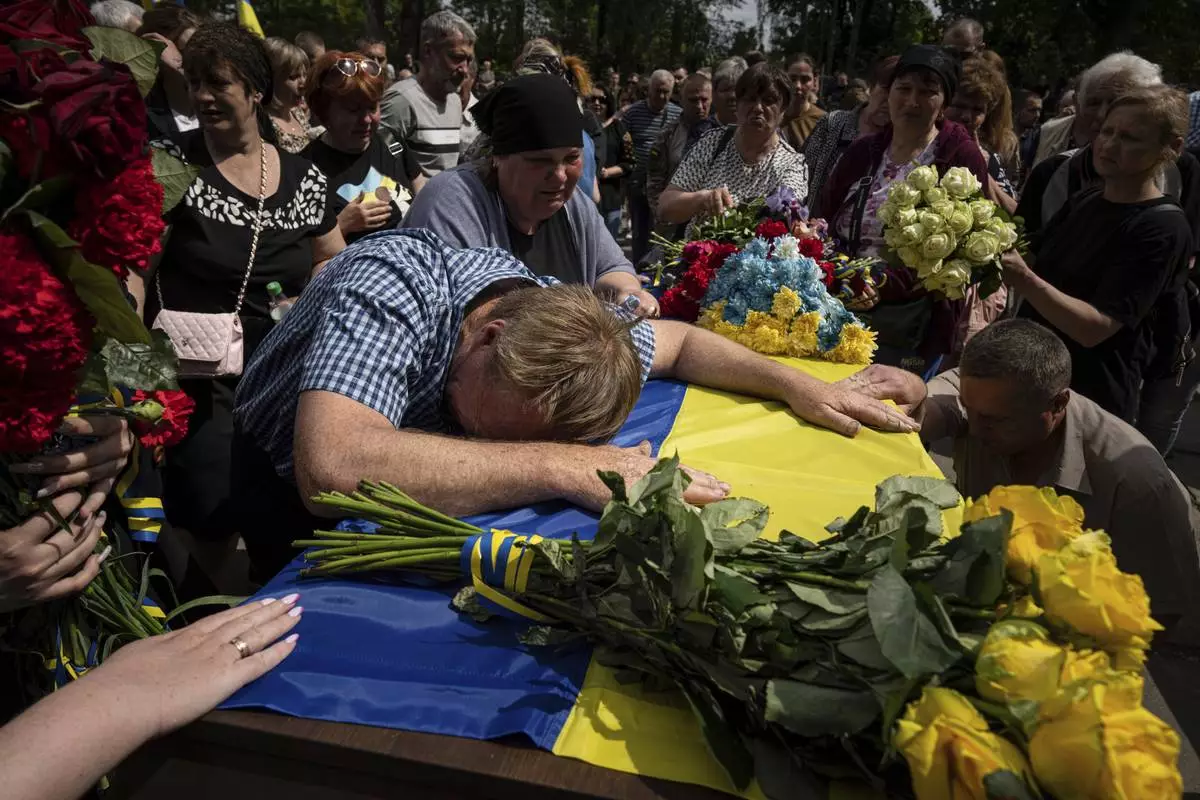
FILE - Leonid Konyaev and Valentina Konyaeva cry over the coffin of their son, Andrii Konyaev, a member of the Azov unit, during his funeral in Fastiv, Ukraine, on Tuesday, May 23, 2023. He and more than 50 Ukrainians died in the July 29, 2022, explosions at Olenivka, a Russia-controlled prison camp in eastern Ukraine. (AP Photo/Evgeniy Maloletka, File)
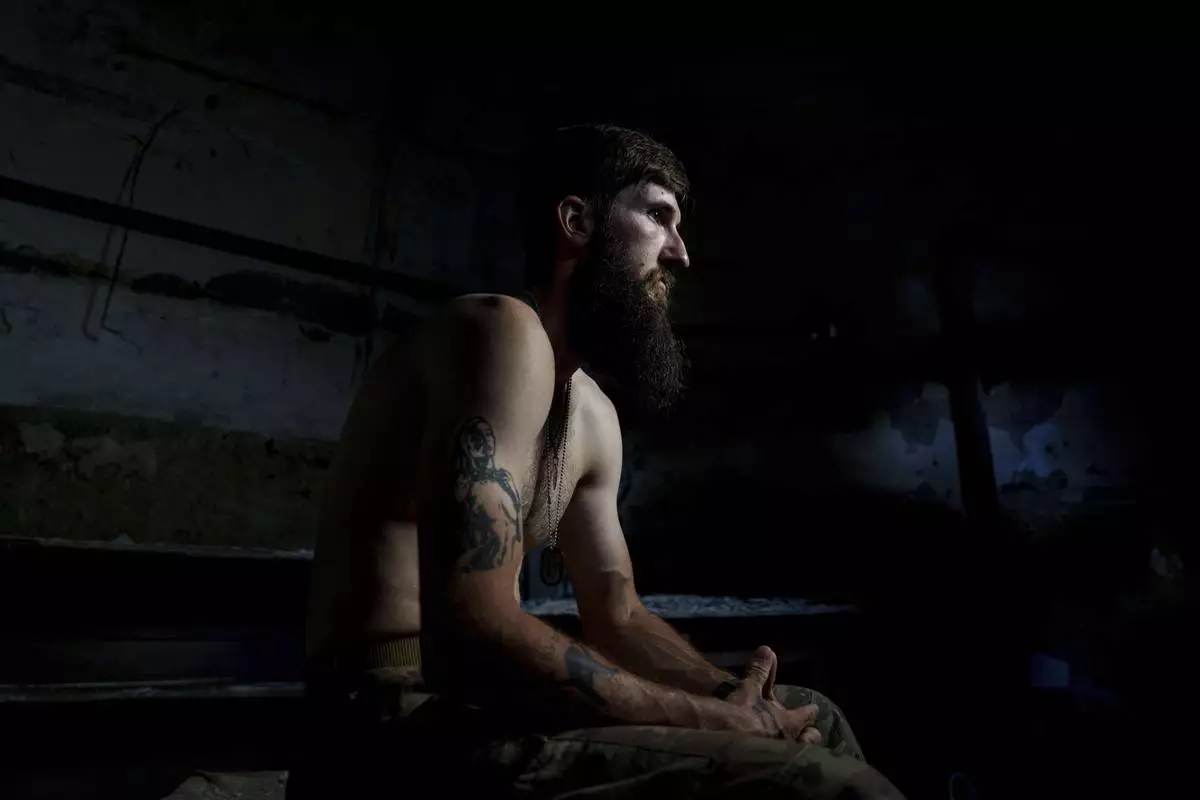
Sgt. Kyrylo Masalitin, known as Maslo, who survived the explosion at the Russian-controlled Olenivka prison two years ago that killed more than 50 Ukrainian POWs, sits for a portrait in Lyman, Donetsk region, Ukraine, Thursday, July 11, 2024. "In front of my eyes, there were guys who were dying, who were being revived, but it was all in vain," said Masalitin. (AP Photo/Evgeniy Maloletka)
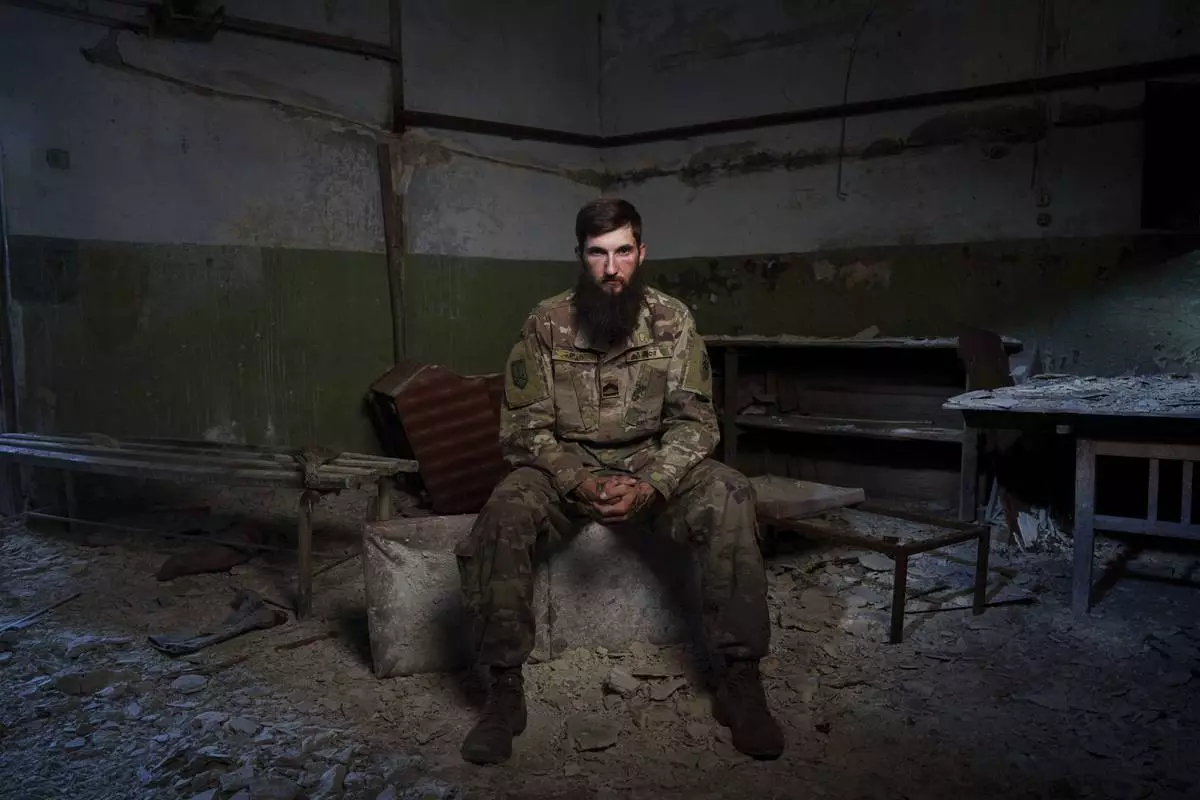
Sgt. Kyrylo Masalitin, known as Maslo, who survived the explosion at the Russian-controlled Olenivka prison two years ago that killed more than 50 Ukrainian POWs, sits for a portrait in Lyman, Donetsk region, Ukraine, Thursday, July 11, 2024. "In front of my eyes, there were guys who were dying, who were being revived, but it was all in vain," said Masalitin. (AP Photo/Evgeniy Maloletka)
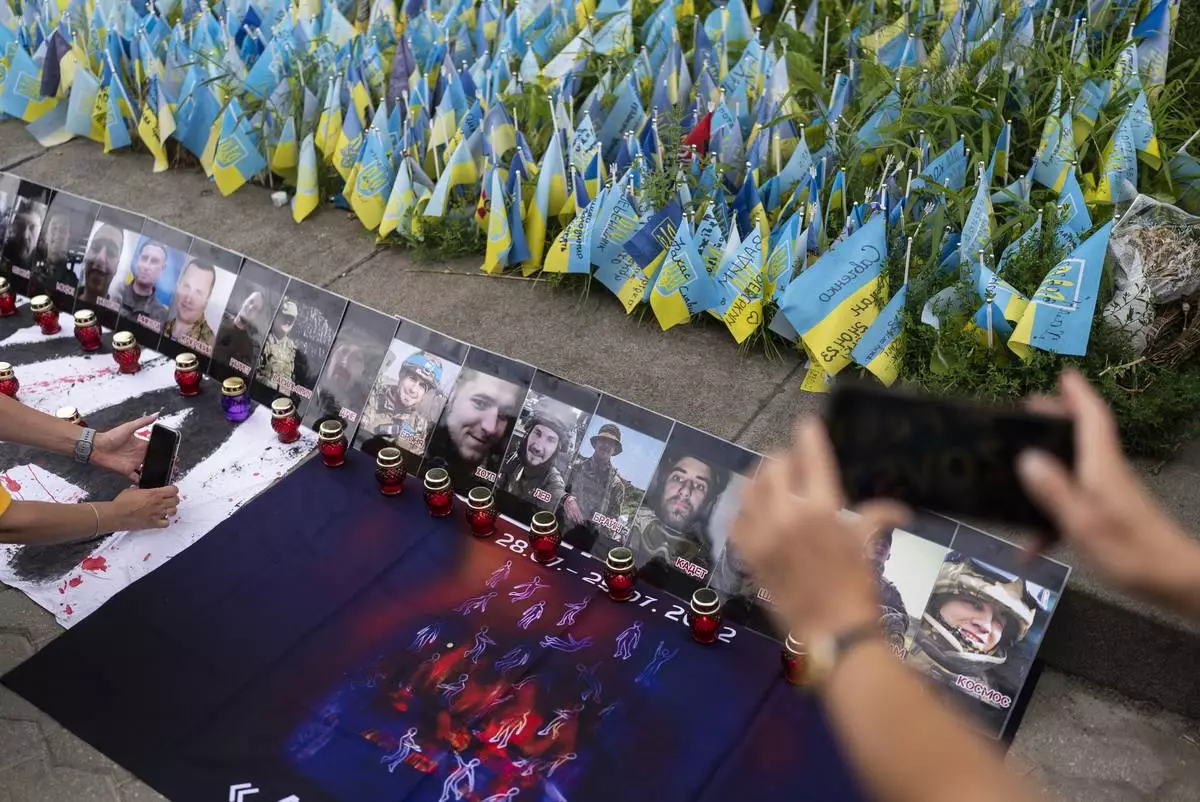
FILE - Photos of Ukrainian POWs killed in the explosions at the Russian-controlled barracks in Olenivka, eastern Ukraine, are placed around a memorial in Kyiv, Ukraine, Saturday, July 29, 2023, to mark the first-year anniversary of the attack. (AP Photo/Jae C. Hong, File)
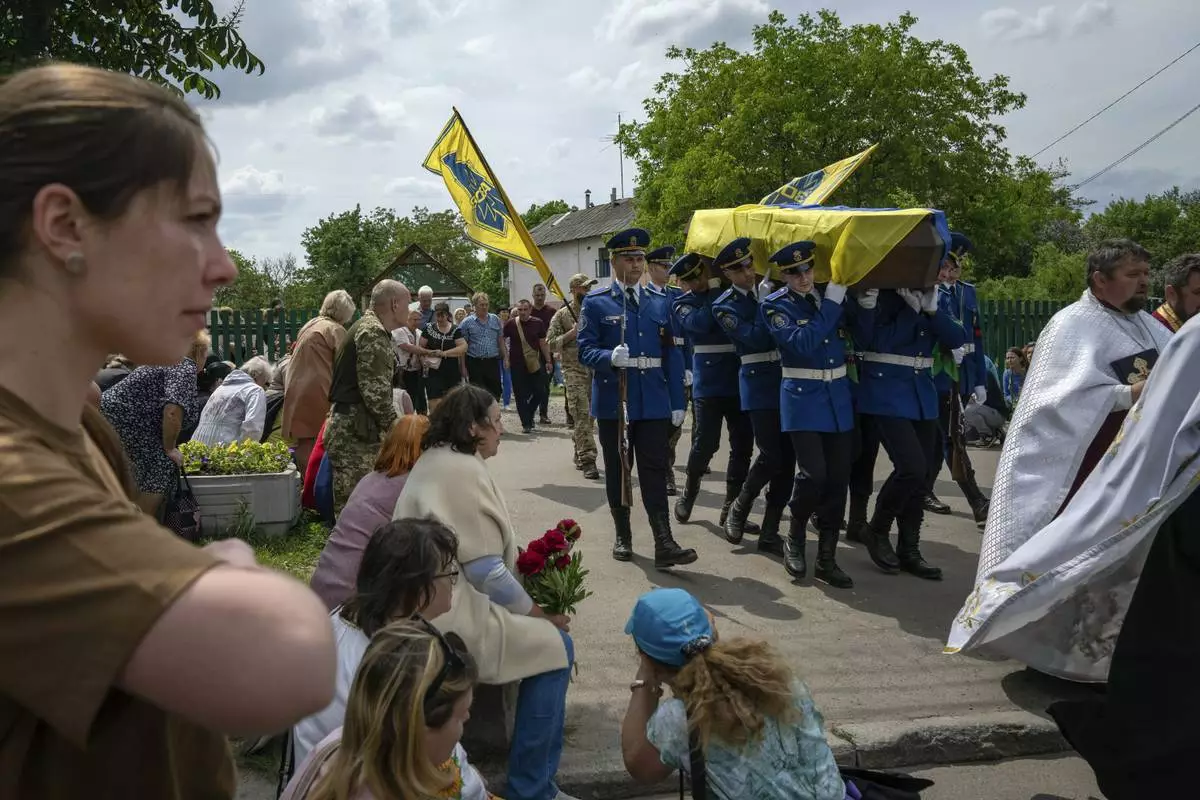
FILE - Soldiers carry the coffin of Andrii Konyaev, a member of the Azov unit, during his funeral in Fastiv, Ukraine, on Tuesday, May 23, 2023. He and more than 50 Ukrainians died in the July 29, 2022, explosions at Olenivka, a Russia-controlled prison camp in eastern Ukraine. (AP Photo/Evgeniy Maloletka, File)
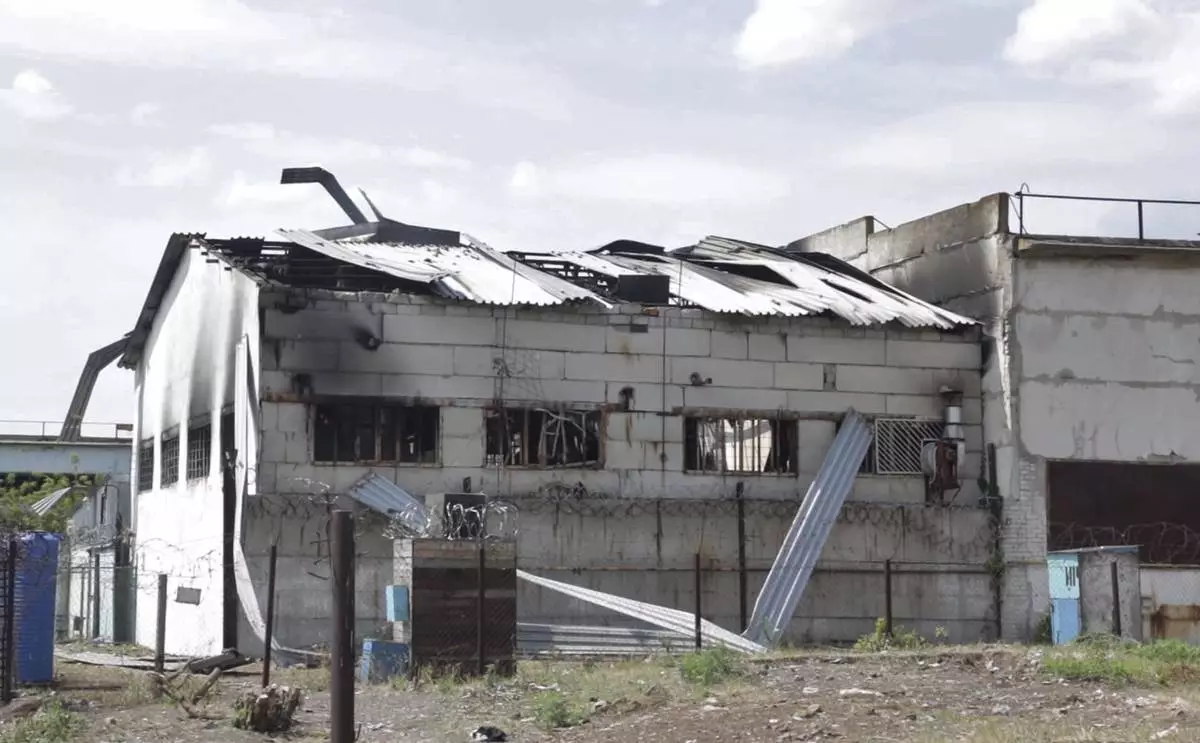
FILE - This image from video shows the damaged barracks at the Russian-controlled Olenivka prison in Olenivka, eastern Ukraine, on July 29, 2022. An AP investigation interviewed survivors, family and investigators and obtained an internal U.N. analysis. All pointed to Russia as the culprit. (AP Photo/File)

EDS NOTE: GRAPHIC CONTENT - FILE - The burned body of a Ukrainian POW lies in the destroyed barracks of the Russian-controlled prison in Olenivka, eastern Ukraine on Friday, July 29, 2022. More than 50 Ukrainians died and dozens were wounded. (AP Photo/File)
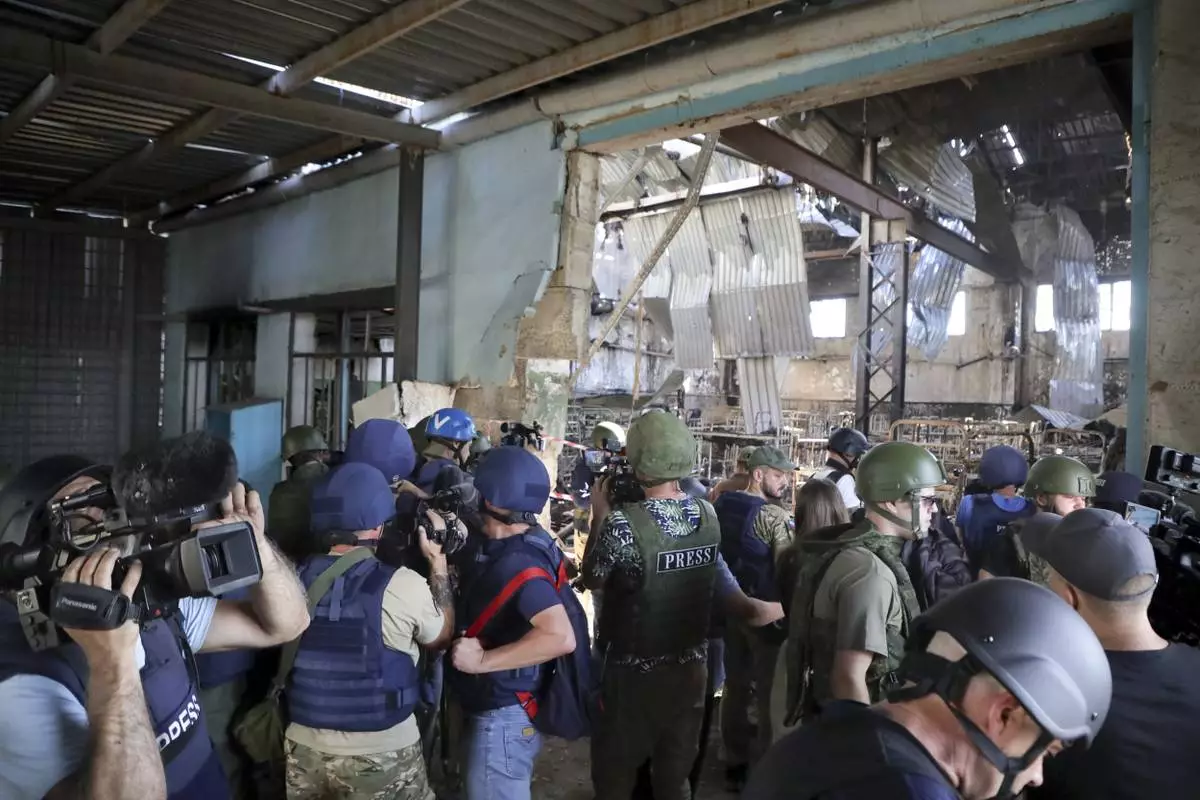
FILE - Journalists visit the destroyed barracks at the Russian-controlled Olenivka prison holding Ukrainian POWs in eastern Ukraine, on Aug. 10, 2022. Russia blamed Ukraine at the time but interviews with survivors witnesses and families of the missing as well as an internal U.N. analysis pointed to Russia as the culprit two years later. (AP Photo/File)3
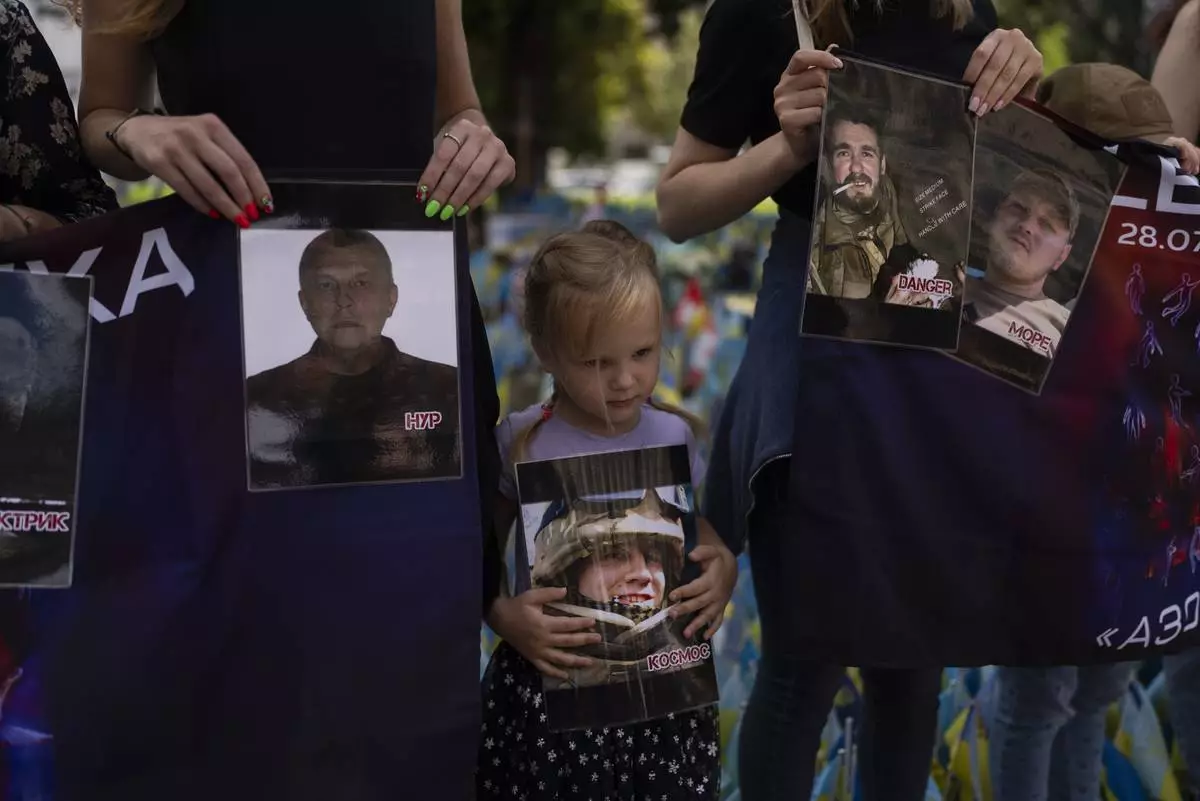
FILE - A girl holds a photo of a Ukrainian POW killed in the 2022 explosions at the Russian-controlled prison barracks in Olenivka, eastern Ukraine, during a memorial in Kyiv on July 29, 2023. An AP investigation interviewed survivors, family and investigators and obtained an internal U.N. analysis. All pointed to Russia as the culprit. (AP Photo/Jae C. Hong, File)


